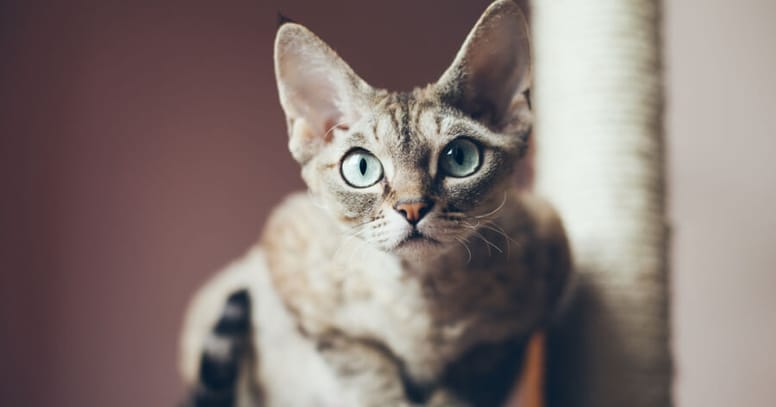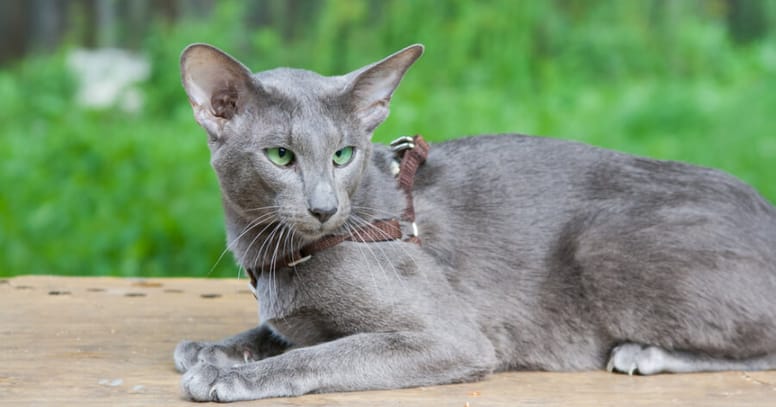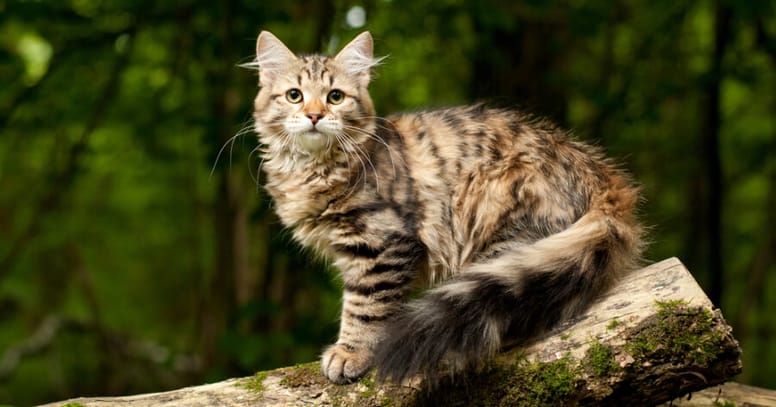Cats are a very popular pet, adored by 5,3M households in the UK. However, there are 10% of cat owners who are sensitive to cat allergens, and many households struggle to maintain a close relationship with their beautiful creatures.
Sneezing, coughing, itchy throat, red eyes, these are some symptoms of a sensitivity to cat allergens. Of course, they aren't enjoyable and depending on their severity, can sometimes be difficult to live with. And it goes without saying, some cat lovers would like to have a furry friend but have to make the difficult decision not to adopt one because of their sensitivity to cat allergens.
If your sensitivity to cat allergens isn't severe, these hypoallergenic cat breeds could be a good match for you.
Cat allergies
Most people believe that it is cat hair that triggers allergies in humans. But in fact, in the cat's saliva there are allergens which are responsible for allergies. The cat allergen called Fel d1 is a protein cats produce naturally in their saliva. Therefore, cat allergy is the result of a person's sensibility to the allergenic protein (Fel d1) secreted by the cat. Because it is present in the cat's saliva, this allergen will regularly spread on the animal's coat when he grooms himself. Also present in the cat's urine and skin dander, Fel d1 spreads easily in your home.
Dr Ebenezer Satyaraj, PhD, immunologist for Nestlé Purina Research, explains, “Many people think that cat hair or dander is the allergen, but it’s actually what’s on it – the major cat allergen called Fel d 1, a protein that cats produce naturally in their saliva.”
The symptoms of cat allergies are quite easy to recognise. They will manifest through various ENT (Ears, nose and throat) and respiratory problems, allergic rhinitis, skin reactions, allergic conjunctivitis and sometimes even asthma.
Cat allergies affect all age groups. Those affected show signs of allergies immediately after being in contact directly with a cat (stroking, playing, caring for the animal) or after spending some time in a place where a feline stayed.
There is also a genetic predisposition to allergies. Indeed, if there is an history of allergies in the family, the risk is multiplied by 4. People with asthma are also more sensitive. Finally, you should also know that a person may very well have lived with a cat for many years, never showing any symptoms, and suddenly, when they adopt another cat, become allergic.
Cat allergy: are any cats really hypoallergenic?
If you are allergic to cats, there are a few criteria you need to consider.
First, it is essential you take into account the feline's coat and its sebum production (the main vehicle of the allergen). Male cats produce more allergenic proteins, while neutered male and female cats produce less due to reduced hormone levels.
Secondly, be aware that there are no such thing as 100% anti-allergenic cat breeds. This is why we talk about "hypoallergenic cats", that is, breeds with less allergenic potential. The reason why it would be better for a person suffering from allergies to choose a hypoallergenic cat is because it will help prevent crises and manage their allergies in their everyday life.
It's also important to note that just like humans, every cat is different. Thus, some allergic people will be able to cohabit without any problem with a so-called "hypoallergenic" cat, while others will suffer from the same symptoms they would with any other cat breed. In addition, the amount of allergens can vary from animal to animal, sometimes even between cats from the same litter.
Hypoallergenic cat breeds: What is the best cat for someone with allergies?
Just because you are allergic to cats, doesn't mean you can't ever get one or be near one. However, if you wish to get a cat, it will probably be best you choose a hypoallergenic cat breed. Indeed, these types of cats, also referred to as low allergen are known to produce fewer allergens that other cat breeds. Just remember, no cats are completely hypoallergenic, but some cat breeds produce less of the Fel D1 protein. Keep in mind that it is not because you own a hypoallergenic cat that you won't have any allergic reactions, but it will reduce the chances of being affected everyday.
If you want to know which are the most hypoallergenic cat breeds, read the following list!
Devon Rex

This cat breed is very independent. Nevertheless, the Devon Rex will shower his family with love and attention when they are around.This cat breed has the same type of coat as the Cornish Rex, but has even less hair than this one. It also sheds very little and is even among the breeds of cats that shed the least amount of hair, a significant argument for people who are sensitive to allergens.
Balinese

This breed is sometimes referred to as the "long haired Siamese". When you look at it, you wouldn’t guess that he is among the non-allergic cats. But, as you read before, what causes an allergy is a protein found in the cat’s saliva. Balinese cats produce much less of the Fel D1 protein, so their fur carries less of the allergen around.
Cornish Rex
.jpg)
The Cornish Rex is an unusual cat. It is small to medium in size with an egg-shaped head and large ears. He is very affectionate and attention-seeking and he bonds well with his human family. It should be noted that the coat of cats is made up of several layers: the guard hair, the undercoat and the awn hair. The Cornish Rex only has the third layer of undercoat, which makes it a very soft cat to the touch, but above all an ideal cat for people with allergies.
Russian blue cat

People who suffer from cat allergies are often advised to get a Russian blue. Unlike many of the hypoallergenic cats on this list, the Russian blue is as twice as hypoallergenic than the other breeds. Indeed, this feline produces very few Fel d1 protein and its double coat absorbs the protein in its skin.
Javanese
.jpg)
The Javanese is very intelligent and sometimes you might even think that they understand when spoken to. They will look a person straight in the eye and answer with a meow! Javanese have excellent communication skills. To make it better, this cat breed also has less body hair than the others, which significantly reduces the spread of the allergenic protein in the house.
Bengal cat
.jpg)
Bengals have a special coat. They have uniquely fine pelts that require considerably less maintenance than other breeds. Bengals don't groom themselves as often so their fur contains less allergen-rich saliva. Finally, they don't shed much, so the dander in their fur doesn't spread around as much.
Sphynx cat
.jpg)
A first look at them and you might think that Sphynxes are hairless! But actually, they are covered with a fine layer on their coat that can barely be felt or seen. They are often heavily wrinkled around the shoulders, between the ears, and around the muzzle. Vets considered them excellent hypoallergenic cats! Additionally, they are well-behaved, energetic and extrovert.
Oriental Shorthair Cat

Oriental shorthairs come in more colours and patterns than any other cat breed in the world. But no matter the style they have a very short, fine coat that sheds infrequently. This makes them hypoallergenic cats. However, it's still recommended that this breed is given regular grooming sessions to keep dander to a minimum.
Siberian cat

The Siberian cat is extremely agile, intelligent and gets along with children, other cats and dogs. This active cat is thought to produce some of the lowest levels of Fel D1 making it one of the most hypoallergenic cat breed.
LaPerm cat

The most notable feature of a LaPerm cat is his unique, curly coat. The nature of this coat is responsible for a reduced allergic reaction for many cat-allergy sufferers. They are hypoallergenic cats because LaPerms shed less than most cats, and their curls help keep their dander from spreading around.
Cats that don't shed
There are so many benefits when owning a cat. They are soft, playful, fun, adorable to look at and if you are lucky, some love to cuddle. They keep us company and secretly loves us unconditionally but won't show it. However, there are also some downsides about cats, just like any other pets. Cats can be a bit destructive and loves to scratch on pretty much everything. Not only that, some cat breeds tend to shed a lot and your clothes, sofa or bed will be covered by cat hair. For some, it is not a problem, but for others they might be a little bit irritated.
However, for some people, shedding is a problem because they suffer from allergies. Whether you have a sensitivity to cat allergens or are looking for a cat that doesn't shed a lot, there are cat breeds that either don't shed at all or don't shed nearly as much as other cat breeds. There are:
- Sphynx
- Siamese
- Japanese Bobtail
- Devon Rex
- Cornish Rex
- Oriental Shorthair
- Russian Blue
- Birman
- Siberian
- Burmese
Now you know which are the most hypoallergenic cats. If you get any of these cats, you should not worry too much about your allergies. Adopting a hypoallergenic cat can therefore be an alternative for people who are sensitive to cat allergens and wish to adopt. However, keep in mind that prevention is important. Hygiene measures are highly recommended (vacuum regularly, change the litter more often, wash your hands, ventilate your house). Hypoallergenic cats may help to prevent allergies or make it easier to manage, but it won't stop it. You need to consider the severity of your allergy, or if you have asthma, to determine if getting a cat is a good choice.



